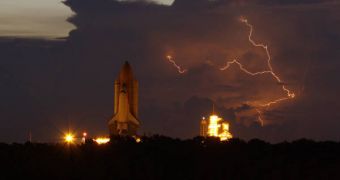Engineers at the American space agency NASA have recently announced that they may have to roll the space shuttle Discovery and its rockets back to the Vehicle Assembly Building (VAB) at the Kennedy Space Center, in Florida. They say that the external fuel tank has a foam-shedding problem, which could jeopardize the planned August 25 launch date. At this point, no clear decision has been made, and mission planners are pushing ahead with the preparations. Due to the delays that Endeavor had in launching, which pushed back the original date by a month or so, the entire launch manifest for this year is in danger of being delayed.
Discovery's launch window to the International Space Station (ISS) stretches from late August to September 3. If the craft does not launch by then, it will only be able to do so again in early October. On September 10, a brand new Japanese unmanned spacecraft is scheduled to make its maiden flight to the station, and this launch cannot be delayed. “I suspect there will be a good deal of discussion about this,” says NASA spokesman Kyle Herring, from the agency's Johnson Space Center, in Houston, Texas, quoted by Space.
Discussions over the readiness level of the mission began yesterday, and are scheduled to go on through today. Following these talks, mission managers and planners hope to have a final time line of the launch, regardless whether they have to roll Discovery back or not. Matters are made even more complex by the fact that, on September 20, a Russian Soyuz capsule is scheduled to take off for the ISS, in order to deliver a new crew and replace a part of the existing one. This launch cannot be delayed either.
Concerns about the foam are not misplaced, as the 2003 Columbia tragedy is still fresh in everyone's mind. In that accident, a large piece of insulating foam broke off from the external fuel tanks, and made a 6- to 10-inch hole in the shuttle's heat shield. Upon reentry, hot gases blew through the opening, and caused massive structural damage to the craft, which eventually led to its destruction. This was not by far a singular event. When Atlantis launched in May and Endeavor in July, similar pieces of insulation were seen falling from the tank, and impacting the heat shield on the wings of the shuttles.
Optimism is high that Discovery will launch on time, experts say. High-energy X-ray images of the Brackets that carry the foam insulation have revealed no minuscule cracks, so chances are that the new launch will go on without a hitch. The STS-129 mission to the ISS will carry the Multi-Purpose Logistics Module Leonardo, as well as a number of new scientific experiments. It will also replace station flight engineer Timothy Kopra with NASA astronaut Nicole Scott as the new flight engineer.

 14 DAY TRIAL //
14 DAY TRIAL //